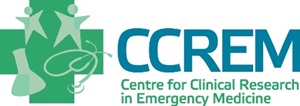Centre for Clinical Research in Emergency Medicine
RPH has the longest-serving ED in the state, providing emergency care since 1906. Our ED is very active in research, aiming to advance emergency care available to patients in WA, Australia and around the world.
The Centre for Clinical Research in Emergency Medicine (CCREM) is a unique unit established at Royal Perth Hospital, Perth, Western Australia that brings together clinical staff working in the Emergency Department (ED) and laboratory scientists using immunological and molecular biological techniques. CCREM investigates a number of conditions within the spectrum of disease treated by EDs including:
- Sepsis and septic shoch (www.arisefluids.org, Critical Illness in Shock Study)
- Emergency and illicit drugs (Emergency Drugs Network of Australia)
- Concussion and traumatic brain injury (AUS mTBI)
- Trauma Management (FEISTY II)
- Non-Suicidal Self Injury (NSSI-ED)
- Influenza and effectiveness of influenza vaccines (FluCAN)
- Snake envenoming (Australia Snakebite Project)
- Alcohol-related ED Presentations (WA Model for Violence Protection)
Over the years, our research has informed and improved clinical approaches to spontaneous pneumothorax, chest pain, sepsis, critical illness, anaphylaxis, illicit drug intoxications, snake envenoming and redback spider bite. Ongoing studies are expected to have similar impacts.
Check out our 2024 Annual Report here!
Our Projects
ARISE FLUIDS: Australasian Resuscitation in Sepsis Evaluation: FLUid or vasopressors In emergency Department Sepsis
CPI Prof Sandra Peake (The Queen Elizabeth Hospital, SA) and Clin A/Prof Stephen Macdonald (CCREM)
Emerging Drugs Network of Australia (EDNA)
Prof Daniel Fatovich (CCREM)
The Emerging Drugs Network of Australia - Google Scholar
CCREM is part of the Harry Perkins Institute of Medical Research, established in 2008 with funding from RPH, the RPH Medical Research Foundation and the University of Western Australia.
Our philosophy is that good clinical research is an essential core activity that should run 24 hours a day and is integral to the function of our Emergency Departments.
Structured research protocols bring high quality evidence-based practice to the bedside right now to benefit our patients and help us to improve treatments and outcomes in the future.
The leadership team of CCREM have outstanding national and international profiles and are highly regarded in delivering best practice clinical care to Emergency Departments. Our academics hold appointments within UWA's Discipline of Emergency Medicine.
Our research is achieved by working within a national and international collaborative network involving researchers working in the fields of toxicology, immunology, allergy, respiratory medicine, intensive care, geriatrics, cardiology, trauma, microbiology, clinical pharmacology, pharmaceutical sciences and statistics.
We are a leading clinical trials centre for Emergency Medicine in Australasia, with the only wet lab within an Emergency Department. This has generated a unique biobank of blood samples from the early hours of critical illness.
Research includes observational studies and laboratory work designed to uncover the mechanisms of disease, and randomised controlled trials designed to improve clinical care.
We endeavour to integrate laboratory and clinical research, using laboratory studies to help us understand the results of clinical trials.
CCREM provides opportunities for both laboratory and clinical post-graduate honours and PhD students, and research terms for Emergency Medicine Advanced Trainees at RPH.


